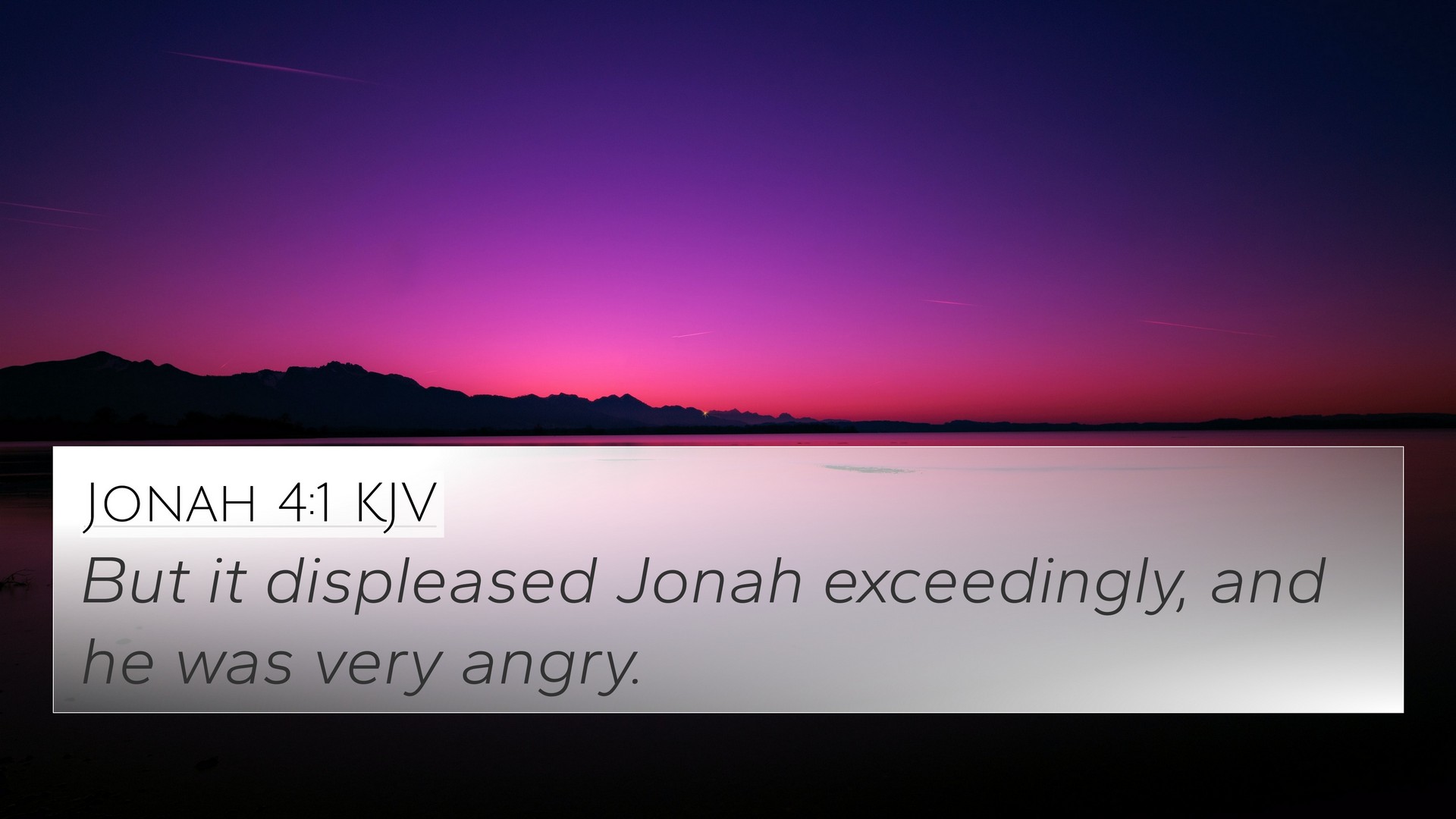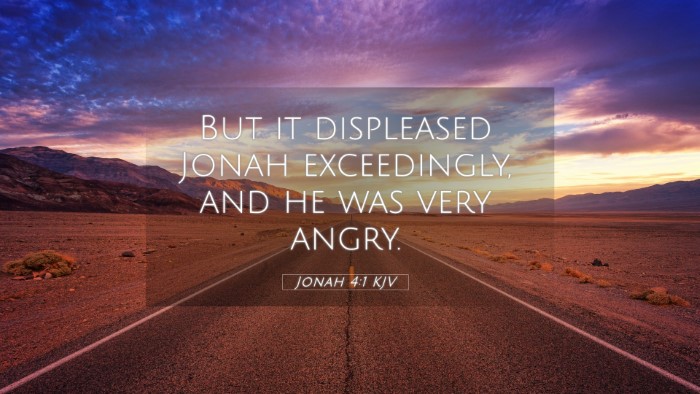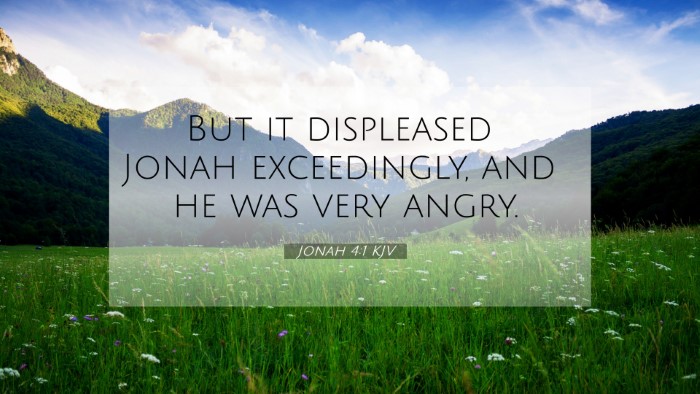Old Testament
Genesis Exodus Leviticus Numbers Deuteronomy Joshua Judges Ruth 1 Samuel 2 Samuel 1 Kings 2 Kings 1 Chronicles 2 Chronicles Ezra Nehemiah Esther Job Psalms Proverbs Ecclesiastes Song of Solomon Isaiah Jeremiah Lamentations Ezekiel Daniel Hosea Joel Amos Obadiah Jonah Micah Nahum Habakkuk Zephaniah Haggai Zechariah MalachiJonah 4:1 Similar Verses
Jonah 4:1 Cross References
But it displeased Jonah exceedingly, and he was very angry.
Uncover the Rich Themes and Topics of This Bible Verse
Listed below are the Bible themes associated with Jonah 4:1. We invite you to explore each theme to gain deeper insights into the Scriptures.
Jonah 4:1 Cross Reference Verses
This section features a detailed cross-reference designed to enrich your understanding of the Scriptures. Below, you will find carefully selected verses that echo the themes and teachings related to Jonah 4:1 KJV. Click on any image to explore detailed analyses of related Bible verses and uncover deeper theological insights.
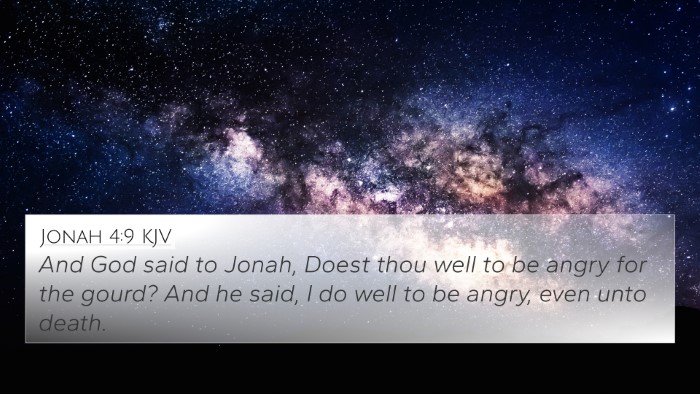
Jonah 4:9 (KJV) »
And God said to Jonah, Doest thou well to be angry for the gourd? And he said, I do well to be angry, even unto death.

Luke 15:28 (KJV) »
And he was angry, and would not go in: therefore came his father out, and intreated him.

Matthew 20:15 (KJV) »
Is it not lawful for me to do what I will with mine own? Is thine eye evil, because I am good?

Luke 7:39 (KJV) »
Now when the Pharisee which had bidden him saw it, he spake within himself, saying, This man, if he were a prophet, would have known who and what manner of woman this is that toucheth him: for she is a sinner.
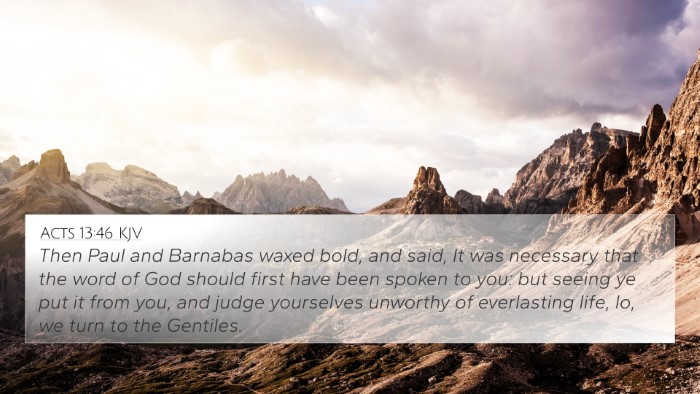
Acts 13:46 (KJV) »
Then Paul and Barnabas waxed bold, and said, It was necessary that the word of God should first have been spoken to you: but seeing ye put it from you, and judge yourselves unworthy of everlasting life, lo, we turn to the Gentiles.
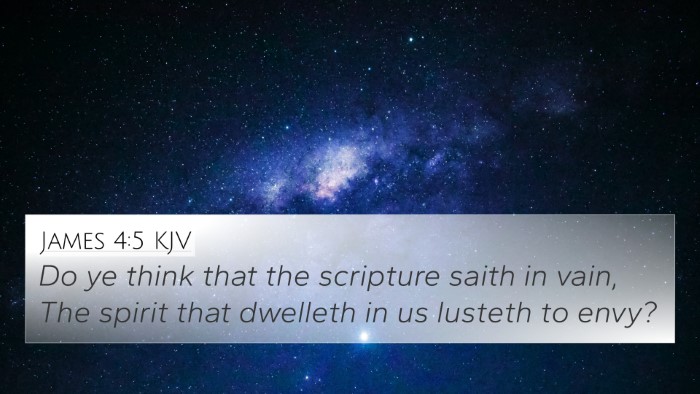
James 4:5 (KJV) »
Do ye think that the scripture saith in vain, The spirit that dwelleth in us lusteth to envy?
Jonah 4:1 Verse Analysis and Similar Verses
Understanding Jonah 4:1
Jonah 4:1 states, "But it displeased Jonah exceedingly, and he was very angry." This powerful verse captures the emotional response of Jonah after God spares Nineveh, a city that he believed deserved punishment. We can delve into this verse by examining its context, reflecting on Jonah's frustrations, and linking it to broader Biblical themes.
Contextual Overview
The book of Jonah is a narrative about God's call to a prophet to preach repentance to the city of Nineveh. In the preceding chapters, Jonah attempts to flee God's command but eventually obeys. The immediate context of this verse reveals Jonah's unexpected reaction to God's mercy towards a people his culture considered enemies.
Insights from Public Domain Commentaries
Various commentaries, including those by Matthew Henry, Albert Barnes, and Adam Clarke, offer rich interpretations of this verse:
- Matthew Henry: He highlights Jonah’s failure to comprehend God's mercy and grace. Instead of rejoicing over the salvation of Nineveh, Jonah’s anger reflects his unwillingness to embrace God's expansive mercy that goes beyond his nationalistic beliefs.
- Albert Barnes: Barnes notes that Jonah’s displeasure is not only a personal grievance but also illustrates a common struggle between divine compassion and human prejudice. This conflict exemplifies how individuals may resist God's plans due to their own biases.
- Adam Clarke: Clarke focuses on Jonah’s emotional state. He suggests that Jonah's anger is indicative of a deeper spiritual issue; jealousy, a misunderstanding of God’s character, and a failure to align with divine objectives.
Thematic Connections
This verse illustrates several key themes:
- Divine Mercy: God's willingness to forgive even the most undeserving is a central theme not only in Jonah but throughout the scriptures. This theme resonates with verses such as Ezekiel 18:23 and 2 Peter 3:9.
- Human Emotions: Jonah’s anger brings to light human emotions in response to divine actions. Other scriptures that delve into personal emotions include Psalms 73:21-22 and Matthew 5:44, where God's will challenges personal feelings.
- Prophetic Calling: Jonah’s reluctance is a stark reminder of the challenges faced by prophets, linking to verses such as Isaiah 6:8 and Jeremiah 20:9 where the prophet’s message and mission are questioned.
Cross-References and Inter-Biblical Dialogue
For deeper understanding, consider these cross-references:
- Micah 7:18-19 - God's compassion and forgiveness.
- Matthew 12:41 - Jesus references Nineveh to illustrate repentance.
- Luke 15:32 - The parable of the prodigal son reflects God's mercy.
- Romans 9:15-16 - God's sovereignty in showing mercy.
- Jonah 1:2 - The initial command to go to Nineveh.
- Jeremiah 18:7-10 - God's sovereignty over nations.
- 1 John 4:19 - The basis of our love as a response to God’s love.
Conclusion
Jonah 4:1 serves as a poignant reminder of human emotions and divine mercy that crosses cultural and personal boundaries. By exploring various public domain commentaries and linking this verse to similar scriptures, we gain a richer understanding of the complexities of God’s character and human nature.
SEO Keywords
This exploration of Jonah 4:1 incorporates several important keywords related to Bible verse analysis:
- Bible verse cross-references
- Connections between Bible verses
- Cross-referencing Biblical texts
- Thematic Bible verse connections
- Comparative Bible verse analysis
- How to find cross-references in the Bible
